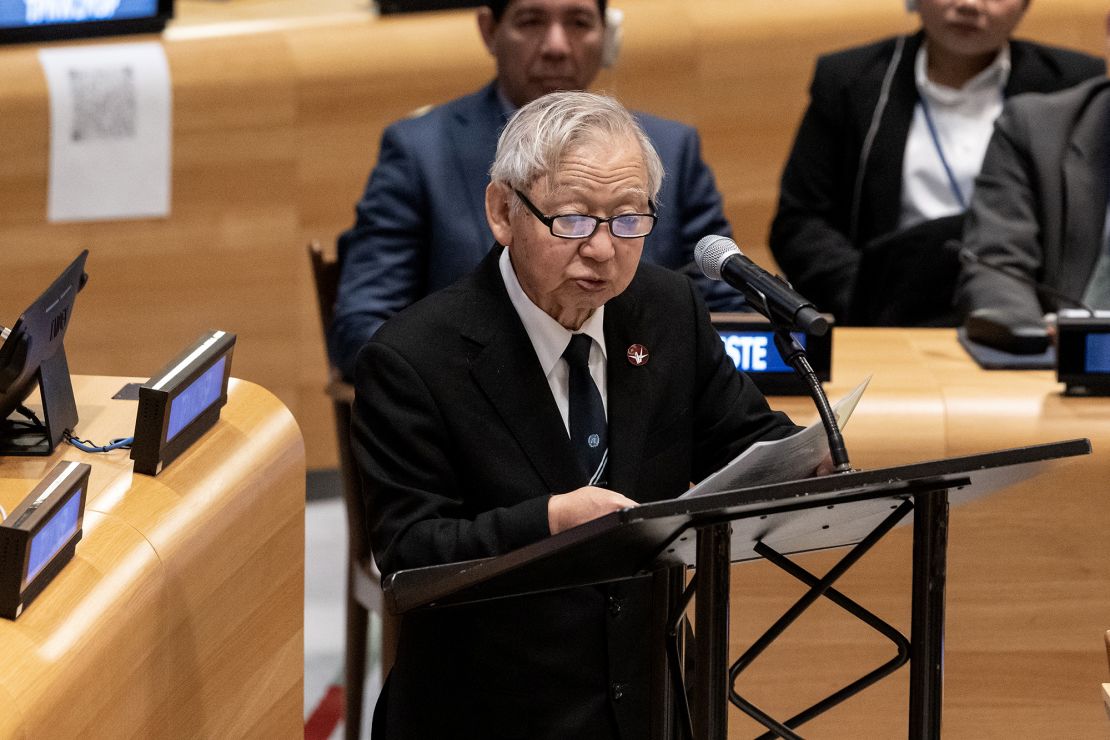CNN
—
The 2024 Nobel Peace Prize has been awarded to Nihon Hidankyo, a grassroots Japanese organization of atomic bomb survivors for its efforts “to achieve a world free of nuclear weapons.”
The Norwegian Nobel Committee praised the group “for demonstrating through witness testimony that nuclear weapons must never be used again.”
The organization, also known as Hibakusha, was formed by survivors of the atomic bombs dropped on Hiroshima and Nagasaki in 1945.
“One day, the atomic bomb survivors from Hiroshima and Nagasaki will no longer be among us as witnesses to history,” the committee said, announcing its decision in Oslo on Friday.
“But with a strong culture of remembrance and continued commitment, new generations in Japan are carrying forward the experience and the message of the witnesses,” it said.
Dan Smith, the director of the Stockholm International Peace Research Institute (SIPRI), told CNN he was “delighted” that the Hibakusha had been awarded this year’s prize.
“As the Soviet and US leaders Gorbachev and Reagan said in 1985, nuclear war can never be won and must never be fought. The Hibakusha remind us of that every day,” Smith said.
“In Nagasaki it is said, the bomb on Nagasaki was the second time a nuclear weapon was used in war: Let it be the last!”
Around 80,000 people died instantly when the United States dropped the atomic bomb on Hiroshima on August 6, 1945. As he watched the mushroom cloud balloon into the sky, Robert Lewis – co-pilot of the Enola Gay, which dropped the bomb – reportedly said: “My God, what have we done?”
Three days later, the US dropped a second bomb on Nagasaki, further killing some 70,000 people. In the years that followed, tens of thousands were killed in both cities by the radiation from the blast.
Friday’s prize is the 105th to be awarded since 1901. Nihon Hidankyo, the 141st laureate, will receive a cash award of around $1 million.
The committee said its decision is “securely anchored” in Alfred Nobel’s will, which outlines three criteria for awarding the prize: “the best work for fraternity between nations, for the abolition or reduction of standing armies and for the holding and promotion of peace congresses.”
Although the will was written before the creation of nuclear weapons, the Nobel Peace prize has previously been awarded to individuals and groups involved in nuclear disarmament.
The International Campaign to Abolish Nuclear Weapons won the award in 2017. In 1995, it was awarded to Pugwash Conferences on Science and World Affairs and the physicist Joseph Rotblat – the only scientist to walk away from the Manhattan Project at the Los Alamos Laboratory on moral grounds.

Nuclear taboo now ‘under pressure’
The committee lauded Nihon Hidankyo for helping to maintain the nuclear taboo, which it said was “a precondition of a peaceful future for humanity.” It said the decision highlighted an encouraging fact that no nuclear weapon has been used in war in nearly 80 years.
However, it conceded that this year’s prize has been awarded when “this taboo against the use of nuclear weapons is under pressure.”
Announcing the prize, Jørgen Watne Frydnes, chair of the committee, said: “the stories and testimonies of the Hibakusha is an important reminder of how unacceptable is the use of nuclear weapons.”
In this year’s annual assessment on the state of armaments, SIPRI reported that the nine nuclear-armed states – the US, Russia, the United Kingdom, France, China, India, Pakistan, North Korea and Israel – “continued to modernize their nuclear arsenals and several deployed new nuclear-armed or nuclear-capable weapon systems in 2023.”
As of January 2024, SIPRI estimates there are 12,121 nuclear warheads across the globe, about 9,585 of which are in military stockpiles for potential use.
“While the global total of nuclear warheads continues to fall as Cold War-era weapons are gradually dismantled, regrettably we continue to see year-on-year increases in the number of operational nuclear warheads,” Smith said. “This trend seems likely to continue and probably accelerate in the coming years and is extremely concerning.”
Since launching his full-scale invasion of Ukraine in 2022, Russian President Vladimir Putin has repeatedly threatened the West with using nuclear weapons. Major Western powers, including the US and Germany, have refused to send Kyiv particular weapons – or allow them to strike deep into Russian territory – for fear of nuclear escalation.



